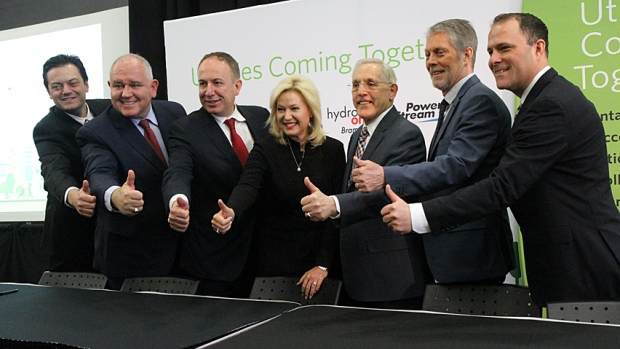
Hamilton residents won't notice much difference in new electricity merger
Giant utility will be second only to Los Angeles in size. Customers will barely notice, says Tom Adams
CBC.ca
Jan. 16, 2017
By Samantha Craggs

Hamilton residents won't see much difference in their electricity bills now that the city is part of Alectra, the second largest utility corporation in North America.
But the municipalities that are part of the creation of the new super-utility are counting on bigger dividends that they can use on other projects.
Tom Adams, an electricity sector who consultant who researches mergers, says consumers shouldn't expect big savings from a merger that will mean more to politicians and bureaucrats.
"If you're looking at your power bill and it looks ugly to you, and you want it to look better, this isn't going to do much for you," he said.
In most cases, Adams said, these mergers aren't disasters either.
"If all goes fantastically well with this, the potential upside to the customer is something like a few percentage points over time."
As of Feb. 1, Horizon Utilities will be part of Alectra, a new company that includes EnerSource (Mississauga and area), PowerStream (Vaughan, Markham and Barrie) and Hydro One Brampton. The new utility was unveiled in Mississauga on Monday morning.
The utility encompasses nearly one million customers, and is second only to the Los Angeles Department of Water and Power in terms of size. It will serve residents from Penetanguishene to Niagara.
The new utility says residents will save about $40 per year over a period of 10 years. Such nominal savings are pretty typical, Adams said.
"From a user perspective, (the merger) probably means very little," he said. The rates of the various utilities are already pretty evenly matched. And they're all "relatively well managed" already.
"In the long term, it does create the possibility of some efficiency savings to flow to customers," he said. "But keep in mind, we're talking about half a per cent a year."
The province likes the mergers because it looks like it's trying to save residents money, Adams said. Bureaucrats at utility corporations like them because they gun for the top jobs.
Municipalities like them, he said, because they provide bigger dividends - in this case, $1.1 billion over 25 years. "Municipal councils have a lot of skin in the game," Adams said.
But Mayor Fred Eisenberger sees the merger as a bonus for residents.
A bigger utility eliminates duplication, he said. That means a more efficient operation over time.
And while he acknowledges the savings is marginal, the dividends give the city money to spend on other projects. In Hamilton, he wants to use some of them for his $50 million poverty reduction plan.
"The idea is to find ways we can collaborate and make it good for everyone," he said.
Not everyone on Hamilton city council wanted the merger. In October 2015, city council had a 12-hour marathon meeting where it voted 10-4 to pursue it.
Among the concerns: that Hamilton will have less control over the utility. The city has nearly 80 per cent shareholder ownership of Horizon. It will only own 18.15 per cent of Alectra.
As a board member, Eisenberger will earn about $35,000 per year, as will Paul Benson, Hamilton's other member on the new board. Benson is the former chair of Hamilton Utilities Corporation.
On a 13-person board, Hamilton will have two representatives, Mississauga three, Vaughan three, Markham two and Barrie and St. Catharines one each.
The new utility will serve Alliston, Aurora, Barrie, Beeton, Brampton, Bradford, Hamilton, Markham, Mississauga, Penetanguishene, Richmond Hill, St. Catharines, Thornton, Tottenham and Vaughan.
The Ontario Energy Board approved the merger in December.
